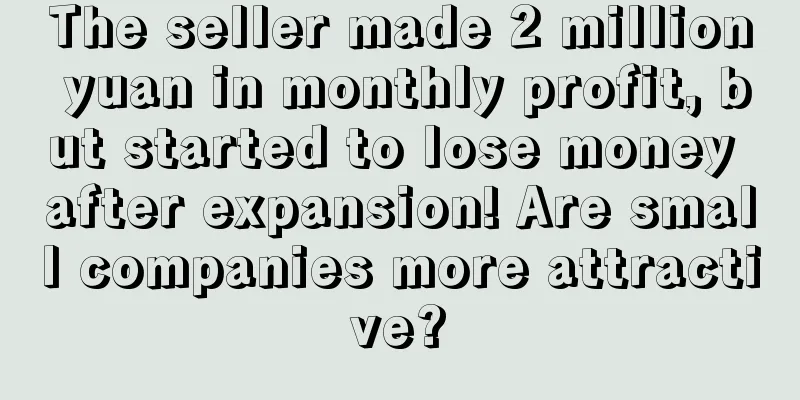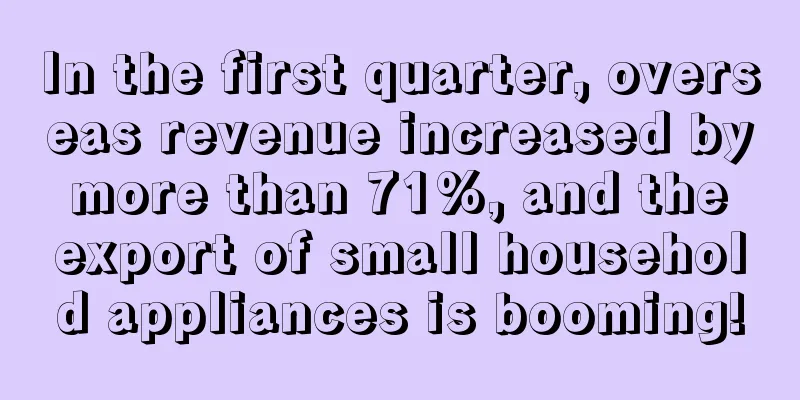The seller made 2 million yuan in monthly profit, but started to lose money after expansion! Are small companies more attractive?

|
In the cross-border circle, bosses and employees have the same thought: Is a big company better or a small company better?
From the boss's perspective, many people take "becoming bigger and stronger" as their life motto, or are tirelessly running towards IPO; there are also many sellers who implement the strategy of "maximizing per capita output value" and are wholeheartedly focused on "small and beautiful".
From the perspective of employees, big companies and small companies naturally have many supporters. The reason why they think big companies are better is usually that they have high salaries, good benefits, and stability and security ; those who like small companies think that big companies only have KPIs, while small companies have dreams...
Which is better, a big company or a small company?
A cross-border company with a monthly profit of 2 million is "losing money" due to expansion, so are small companies more attractive?
Under the influence of inflation, economic recession and other factors, the entire cross-border e-commerce has been suffering in the past two years, with more and more voices of pessimism. The risks that sellers need to bear behind choosing to expand are also greater!
A seller case some time ago caused widespread discussion among sellers, once again pushing the question of whether the company should expand to the center of the topic. Weibo blogger "Foreign Trade Captain" said that an Amazon seller he knew originally had a team of less than 5 people, but his monthly profit could reach more than 2 million, which is a result that far surpasses a large number of sellers.
When a company is booming, the first choice of many sellers is to expand the sales scale in order to "get to the next level". This Amazon seller is no exception. Not only did she move to a larger office with a river view, but she also expanded her team to more than 20 people! However, what she didn't expect was that the company's life after the expansion was not as good as she had imagined. Instead, the situation took a sharp turn for the worse. The company's best-selling links were blocked by a big seller, and the profit plummeted.
After working for a year, I found that I used to earn 2 million yuan a month, but now I am not only not making any money, but I am losing money.
Regarding this case, the main point of discussion among industry insiders is whether the company should choose to expand?
The captain believes that except for cross-border companies like Amiba that are split into small groups with their own profits and losses , most companies cannot measure their performance by the number of people, but instead should pursue a strategy of having a small but elite team .
Sometimes, a company can function normally without a certain person or even a certain position , and may even function better . " Even if the office is in a Class A office building, the monthly rent is expensive, but these expenses are small expenses . The real big part of the company's operating costs is employee salaries, plus the social security and welfare expenses of more than 20 people, the monthly cost is really not low."
Therefore, when a startup company that does not have much money wants to recruit employees , it must make plans to recruit the best and brightest , and not follow the big companies’ approach of reserving talent .
Many people agree with this view that cross-border e-commerce companies still have to take the route of refined operations , and small and fine ones will live better . Especially for small and medium-sized sellers, they need to minimize costs and maximize benefits . Many companies died on the road of expansion. Blind expansion without making correct judgments about the current situation and the future will not only cause costs to soar, but also face more difficult management challenges.
One seller shared his personal experience, saying that he had been full of ambition to expand the company in the past two years . However , after personal experience, he realized that the road to expansion is very difficult , as it involves talent training, product line planning, finance, management and other aspects, and each point is very complicated .
Either small and beautiful, or big and unbreakable . Although more sellers have advocated "shrinking the front" in the past two years, this is also conditional. For companies that are inefficient and involuntarily roll in or copy each other at low prices , expansion is meaningless and only risky. If it is a high-tech company , it has a threshold , patents , technological advantages, industry dividends and resource tilts, and even if it does not want to expand, it will be pushed by the market, but there are too few such companies .
In summary, companies that are confident in their core competitiveness can continue to consider expansion , while those that lack confidence in the future should not rush to expand, but should first stabilize and strengthen the basics and must ensure healthy cash flow, gross profit, and core competitiveness.
The distress of workers: In a big company you can only be a cog in the wheel, but in a small company you need to have all the skills?
Cross-border bosses have the worry of whether to expand or not, and cross-border workers also have the difficulty in choosing whether to work for a small company or a large company.
Generally, there is a high incidence of resignations after the Spring Festival, many of whom are managers of small companies.
"The company has no resources and an imperfect system. I have to rely on myself for everything. I get an operations salary, but I still have to do various other jobs such as development, operations, procurement, and art design." An Amazon operations officer who is planning to resign said that the company is not large and there are only a few people in his department. Under such circumstances, he has to do all kinds of odd jobs every day, but the salary is not high, and the company has no development prospects at all.
Another operator had the same experience. Small companies would use one person to the extreme. When they were busy, they had to go to the factory to help pack goods. They basically participated in all processes of cross-border e-commerce operations. Although the division of labor was not clear, they could gain a lot along the way, which was very helpful for improving their comprehensive capabilities. Unfortunately, they often felt very frustrated. When they built up their accounts, the boss began to reduce commissions. It was obvious that their development had reached the ceiling, so they chose to resign.
In addition, when formulating the annual plan, many operations feedback indicated that the sales targets set by the company were very high. For example, when there were only 1,000 units in stock, the company was required to sell 5,000 units. However, there was no mature system and specifications, nor sufficient funds and resources.
At this time, workers in small companies often aspire to work in larger companies. What is it like to work in a large company?
An operations manager who jumped from a small company to a large one said that large companies offer lower base salaries, but they can take over existing stores and have resources to rely on. The overall framework, operations, promotions, and other aspects are indeed more complete, with a clear division of labor and each person having their own responsibilities. Each link has its own person in charge, so there are fewer things to be touched and it is difficult to accumulate resources. Even so, he does not plan to work alone and still prefers the stability of large companies.
Many workers also have a bad experience in big companies. One operator said that he had worked in a company with thousands of employees, and only received 20,000 yuan in commission for a gross profit of 1 million yuan. Another operator said that a certain big company had very serious overtime, and after violent layoffs, they tried their best to deduct employees' wages...
In the opinion of industry insiders, we should not use "stereotyped thinking" to look at large and small companies, thinking that all large companies are more stable and all small companies have no development prospects. In many cases, it does not make much sense to consider the size of a company. What matters most is the company's operating model and its own resources, as well as the match between its corporate culture and itself. |
<<: Amazon warehouse is out of stock again! Some goods have not been received for 50 days
>>: With only seven products, 300 million yuan was raised! The hot track attracted many big sellers
Recommend
Temu is rising in another country, and local platforms are fighting back!
Amid rising prices and high commodity inflation i...
What is Shenzhen Quanjie Supply Chain Co., Ltd.? Shenzhen Quanjie Supply Chain Co., Ltd. Review, Features
Shenzhen Quanjie Supply Chain Co., Ltd. is a prof...
Cumulative views reach 4.8 billion! Shopee Live builds a high ground for cross-border traffic
On September 11, Shopee’s first promotional event...
No orders at all? Sellers' order volume hits rock bottom
Seller: The order volume fluctuates like a roller...
What is Yanhang Going Out to Sea? Yanhang Going Out to Sea Review, Features
Yanhang Overseas helps Chinese brands successfull...
Disbanded on the spot! Shenzhen's 31-year-old factory collapses
Under the influence of factors such as intensifie...
FBA warehouse explosion intensifies, ONT8 and other four warehouses delivery postponed to April
Previously, due to the continuous winter snowstor...
Flipkart expands its service scope again, hoping to compete with Amazon
According to foreign media reports, Walmart's...
What is MyGlamm? MyGlamm Review, Features
MyGlamm was founded by Darpan Sanghvi in 2017 an...
What is AdSpy? AdSpy Review, Features
AdSpy is one of the world’s largest searchable dat...
The world's largest copper producing country closed its borders, copper prices soared, and sellers stopped accepting orders
It is reported that the Chilean government has de...
Sweeping the United States! More than 90% of Americans flock to this new platform this year
In 2022, Tik Tok Shop opened sites in the UK, Sou...
150 billion worth of goods are piled up, and a large number of containers are stranded! Sellers: We will lose money during this peak season
In order to welcome the upcoming peak season, sel...
With sales of 2.2 billion pieces a year, the first pet care stock is about to be listed!
"Yiyi Shares", which has a market share...
What is Indonesia's Financial Services Authority (OJK)? Indonesia's Financial Services Authority (OJK) Review, Features
<span data-docs-delta="[[20,{"gallery"...









